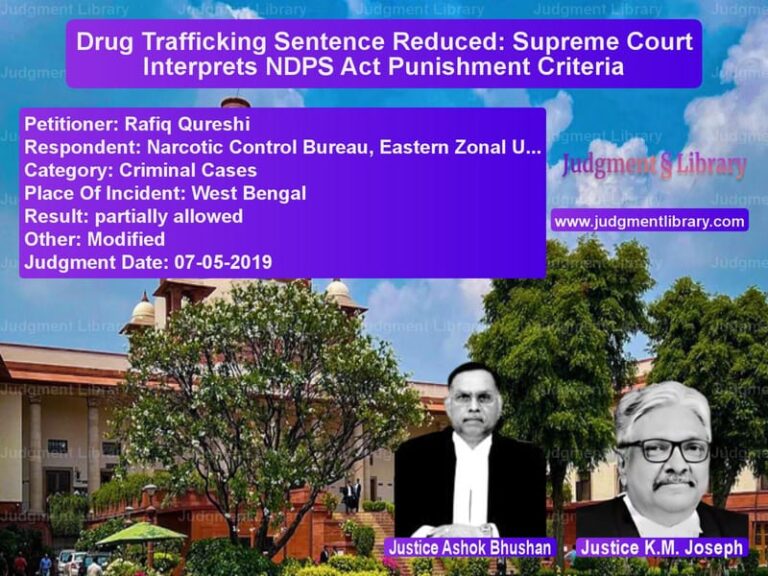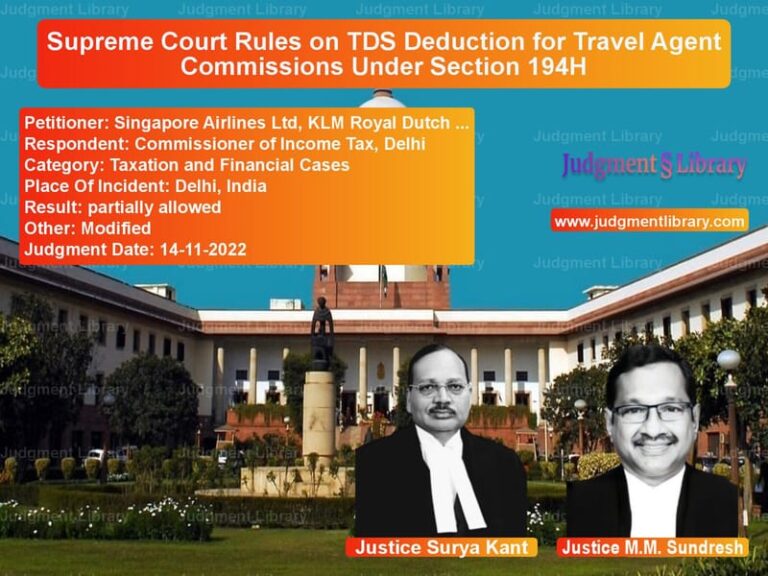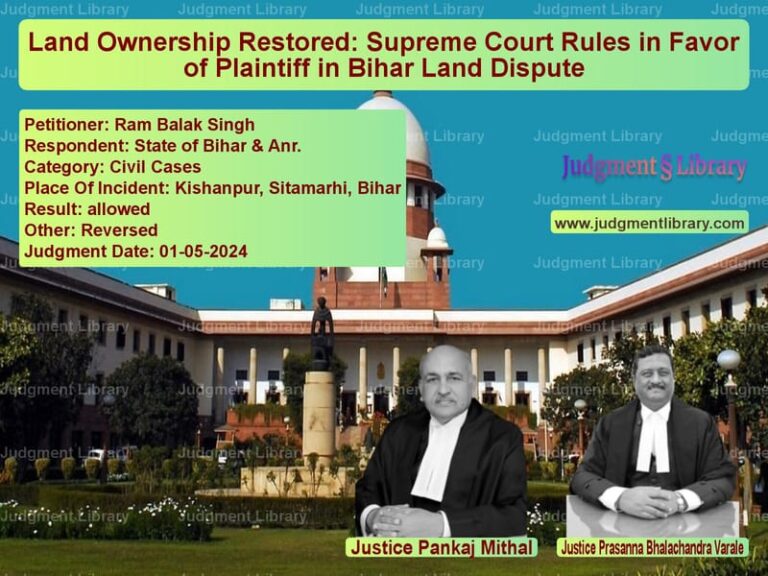Delay in Execution of Death Sentence: Effect of Prolonged Procedures and Violation of Article 21 Rights
The Supreme Court of India, in the case of State of Maharashtra vs. Pradeep Yashwant Kokade and Purushottam Dasrath Borate, ruled on the issue of the delay in the execution of death sentences, its effects on the petitioners, and whether such delays violated the fundamental rights of the convicts. The petitioners had been convicted of heinous crimes including the rape and murder of a woman, for which they were sentenced to death in 2012. However, their executions had been delayed for several years due to procedural hurdles, and the issue of whether such delays would justify commuting their sentences became the core of this appeal.
The delay in the execution of the death sentence was the result of multiple stages of legal and administrative procedures, including mercy petitions and appeals. The petitioners contended that this inordinate delay, lasting more than seven years, violated their right to a fair trial and caused unnecessary mental anguish, leading to a plea for the commutation of their death sentences to life imprisonment.
Background of the Case
The tragic crime took place on November 1, 2007, when the petitioners were involved in the brutal gang rape and murder of a woman, resulting in grievous injuries to her body. The petitioners were arrested, tried, and convicted in 2012, after which they were sentenced to death by the trial court. The decision was upheld by the High Court of Maharashtra, and later by the Supreme Court. However, despite the conviction being finalized, the death sentence was not immediately executed.
The petitioners filed several mercy petitions before the President of India, but there were substantial delays in processing these petitions. The convicts further argued that the delay was due to the inaction of the executive branch, including the state government and central authorities, and not due to any fault of their own.
Legal Issues Raised
- Whether the long delay in the execution of a death sentence violates the right to a fair trial and the fundamental right to life under Article 21 of the Constitution of India.
- Whether the delay in execution can be grounds for commuting a death sentence to life imprisonment under the constitutional framework.
- Whether the petitioners’ mental agony due to prolonged uncertainty regarding their execution constitutes a breach of their human rights.
Arguments Presented
Arguments by the Petitioners
- The petitioners argued that the delay of more than seven years in the execution of the death sentence violated their right to a fair trial under Article 21 of the Constitution. They emphasized that the delay caused them psychological trauma and anxiety, affecting their dignity as human beings.
- The petitioners contended that prolonged uncertainty and delay in execution could not be justified by administrative or procedural reasons. They argued that such delays are inherently inhumane and constitute cruel and unusual punishment.
- The petitioners also argued that the delay in execution should result in the commutation of their death sentences to life imprisonment, as the delay itself amounted to a violation of their rights under the Constitution.
Arguments by the Respondents (State of Maharashtra)
- The respondents, representing the state government, argued that the delays in execution were caused by procedural and legal hurdles, including the filing and processing of multiple mercy petitions. They asserted that the delay was not intentional and did not violate the petitioners’ rights.
- The respondents emphasized that the executive had to follow a proper procedure while processing mercy petitions, and the delays in executing the death sentence were partly due to the complexities involved in such decisions.
- The respondents also pointed out that the Supreme Court had previously upheld the death sentence, and the delay could not be attributed to any fault on the part of the judicial system.
Supreme Court’s Observations
On Delay in Execution and its Impact
The Supreme Court observed that while the death penalty is the highest form of punishment, it must be executed with due respect for constitutional principles and human rights. The Court acknowledged the petitioners’ arguments about the psychological toll caused by the long delay in execution:
“The delay in execution of a death sentence causes undue mental agony to the convict. Such prolonged uncertainty cannot be justified by the mere assertion of procedural reasons. The constitutional guarantee under Article 21 extends beyond the trial and conviction; it includes the right to be free from inhumane treatment and prolonged uncertainty regarding one’s fate.”
On the Application of Previous Judgments
The Court referred to earlier judgments, including Ranjan Kumar v. Delhi (2017), which emphasized that delays in death penalty cases could lead to the commutation of the sentence to life imprisonment. The Court stated:
“It is well established that delay in the execution of a death sentence, if it causes inhuman treatment, can be a valid ground for commutation to life imprisonment. This Court has consistently ruled that such delay, which leads to prolonged uncertainty, undermines the dignity of the individual.”
On the Right to Life and Human Dignity
The Court discussed the broader implications of delay on human dignity and noted that the prolonged mental anguish endured by the convicts constituted a violation of their rights. The Court held:
“While the death penalty remains an option for certain grave crimes, its execution must adhere to principles of fairness, timeliness, and respect for human dignity. The delay in execution must be seen as a violation of the constitutional right to life, as it subjects the convict to extreme psychological distress.”
Final Verdict
- The Supreme Court ruled in favor of the petitioners and commuted their death sentences to life imprisonment. The Court held that the delay in the execution of their death sentences violated their fundamental rights under Article 21 of the Constitution, and therefore, the sentences should be commuted.
- The Court directed the state government to take immediate action to ensure that the convicts serve their sentences in accordance with the law, while also reiterating the importance of ensuring that the procedural delays in mercy petitions do not result in the violation of the convicts’ rights.
- The Court emphasized that the authorities must ensure timely execution of death sentences to maintain the balance between justice and human dignity.
Implications of the Judgment
- Human Rights and the Death Penalty: This ruling emphasizes the need for timely and humane execution of the death penalty and recognizes the mental toll that delays in execution have on convicts.
- Precedent for Future Cases: The Court’s decision sets a precedent for future cases involving delayed executions and clarifies the legal standing regarding the commutation of death sentences due to delay.
- Executive Accountability: The judgment underscores the responsibility of the executive to handle mercy petitions and death sentences efficiently, without unnecessary delays that infringe upon constitutional rights.
- Protection of Constitutional Rights: The Court reaffirmed that delays in the judicial and executive processes that lead to prolonged mental suffering are unconstitutional and cannot be justified under any circumstances.
This case serves as a crucial reminder that justice must be timely and that delays, particularly in death penalty cases, violate the rights of individuals and undermine the dignity of the judicial system.
Petitioner Name: State of Maharashtra.Respondent Name: Pradeep Yashwant Kokade & Anr..Judgment By: Justice Abhay S. Oka, Justice Ahsanuddin Amanullah, Justice Augustine George Masih.Place Of Incident: Maharashtra.Judgment Date: 08-12-2024.
Don’t miss out on the full details! Download the complete judgment in PDF format below and gain valuable insights instantly!
Download Judgment: state-of-maharashtra-vs-pradeep-yashwant-kok-supreme-court-of-india-judgment-dated-08-12-2024.pdf
Directly Download Judgment: Directly download this Judgment
See all petitions in Murder Cases
See all petitions in Custodial Deaths and Police Misconduct
See all petitions in SC/ST Act Case
See all petitions in Suicide Cases
See all petitions in Drug Possession Cases
See all petitions in Judgment by Abhay S. Oka
See all petitions in Judgment by Ahsanuddin Amanullah
See all petitions in Judgment by Augustine George Masih
See all petitions in allowed
See all petitions in supreme court of India judgments December 2024
See all petitions in 2024 judgments
See all posts in Criminal Cases Category
See all allowed petitions in Criminal Cases Category
See all Dismissed petitions in Criminal Cases Category
See all partially allowed petitions in Criminal Cases Category







